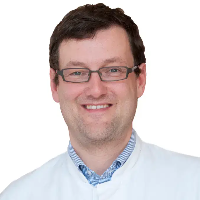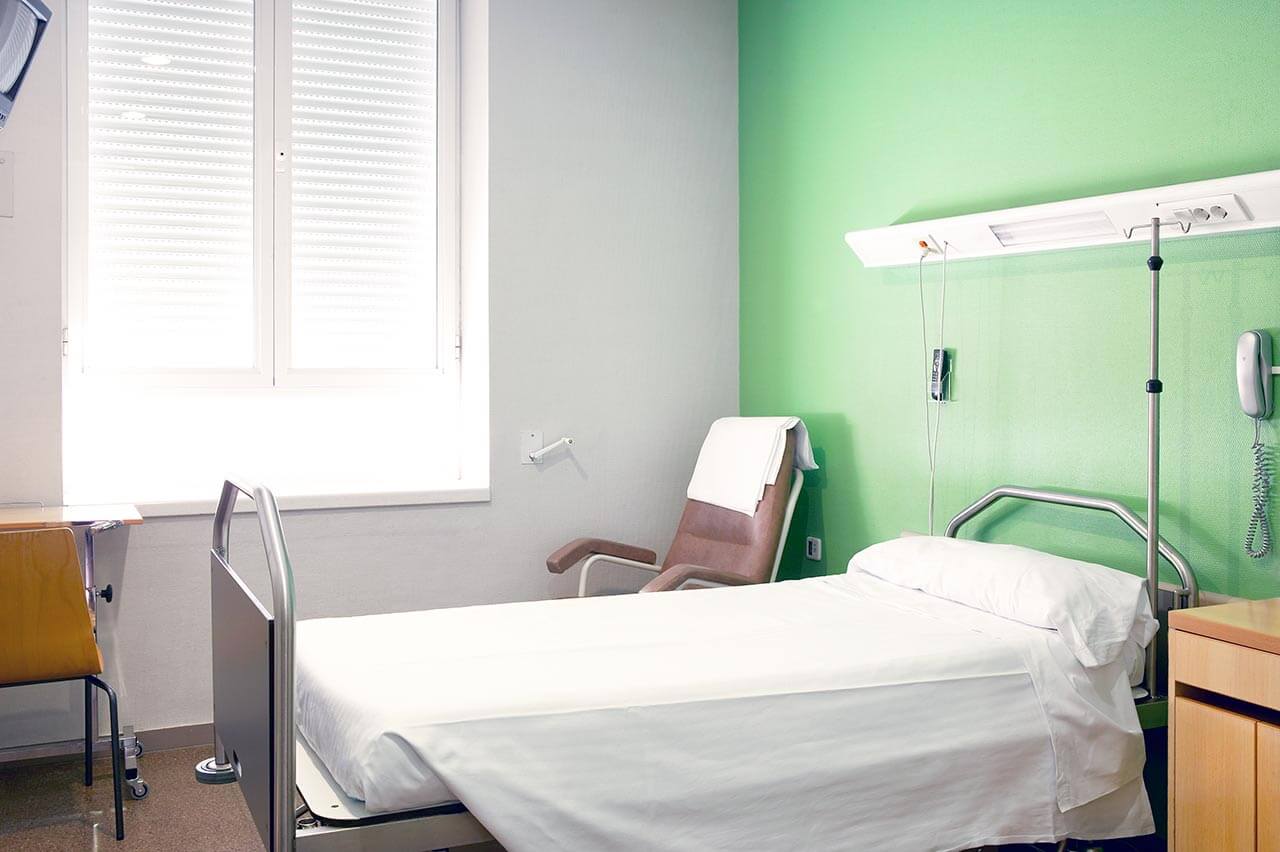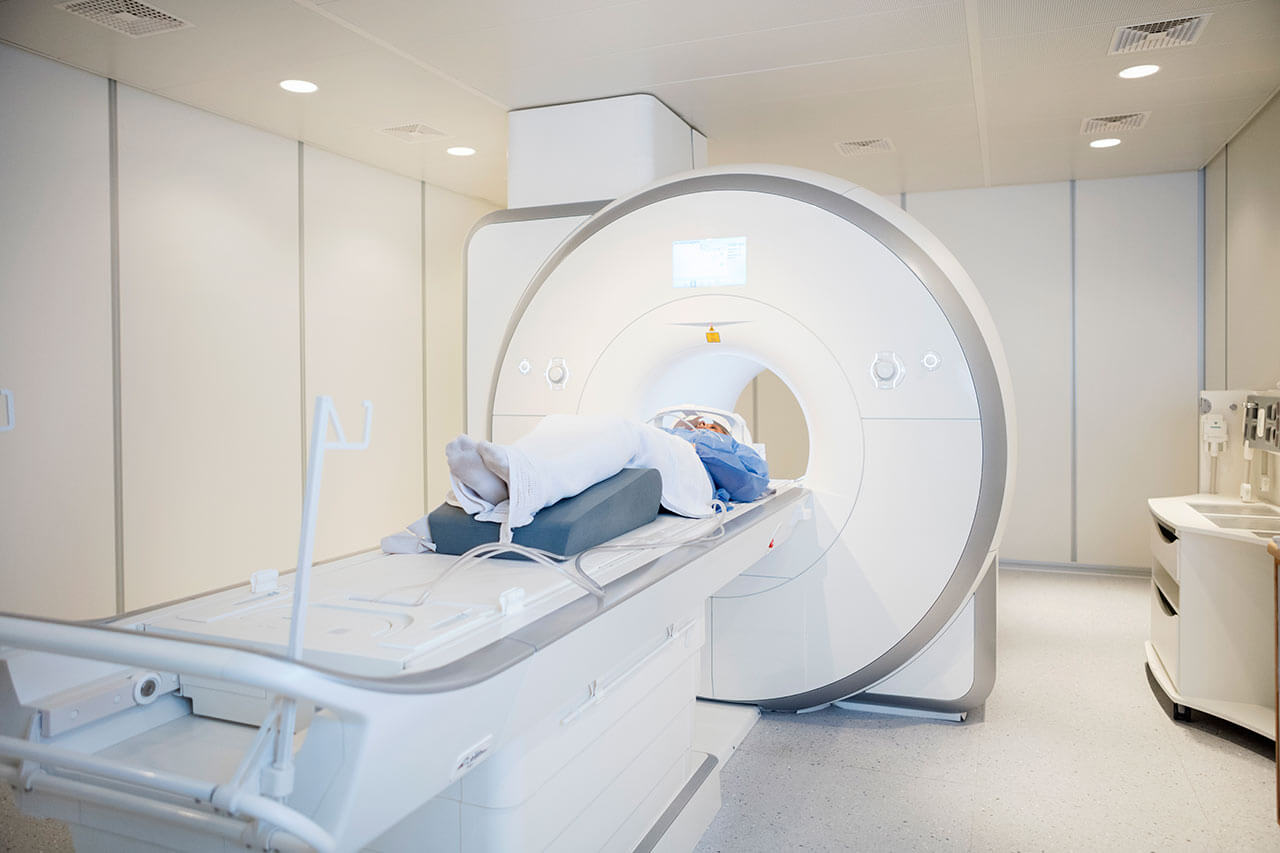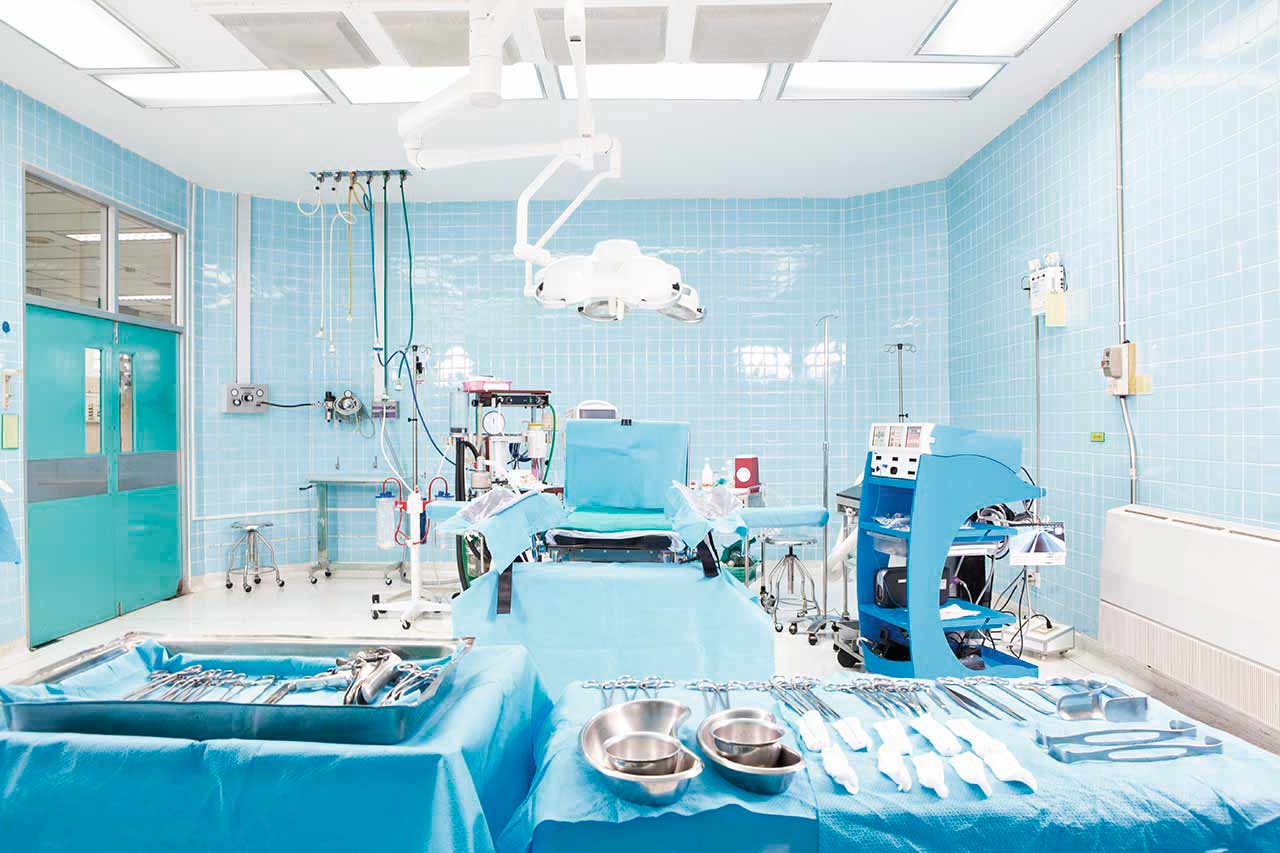
The program includes:
- Initial presentation in the clinic
- clinical history taking
- review of medical records
- physical examination
- laboratory tests:
- complete blood count
- general urine analysis
- biochemical analysis of blood
- inflammation indicators (CRP, ESR)
- indicators blood coagulation
- tumor marker
- CT planning of radiation therapy
- a full course of intensity-modulated radiation therapy (IMRT)
- symptomatic treatment
- the cost of essential medicines and materials
- nursing services
- control examinations
- consultation of related specialists
Required documents
- Medical records
- MRI/CT scan (not older than 3 months)
- Biopsy results (if available)
Service
You may also book:
 BookingHealth Price from:
BookingHealth Price from:
About the department
The Department of Radiation Therapy at the University Hospital of Ludwig Maximilian University of Munich offers all modern services in the field of radiation therapy for cancer treatment. The medical facility uses advanced radiation therapy methods, including intensity-modulated radiation therapy (IMRT), volumetric modulated arc therapy (VMAT), image-guided radiation therapy, brain and lung stereotactic radiosurgery, total body irradiation, brachytherapy, and catheter-based administration of radioactive drugs (afterloading technique). The department is one of the first medical facilities in Germany to successfully use the innovative MR-Linac technology, which makes it possible to obtain high-precision MRI scans during radiation therapy and provide the most effective cancer treatment with optimal protection of the healthy adjacent tissues. It is noteworthy that MR-Linac technology is available only in three healthcare facilities in Germany. The department's radiation therapists cooperate closely with oncologists, chemotherapists, radiologists, and other specialists from related fields, thanks to which patients receive comprehensive treatment. The Head Physician of the department is Prof. Dr. med. Claus Belka.
Breast cancer is one of the most common types of cancer in women. Breast cancer treatment is based on surgery, but in many cases, women are additionally prescribed radiation therapy, for example, after breast-conserving surgery or when cancer cells are detected in the nearby lymph nodes. The optimal type of irradiation for a woman is determined on the basis of her clinical data and anatomical features. In most cases, tangential irradiation is used, during which a patient is in the supine position. In some cases, for example, if a woman has pectus excavatum or if the lymph nodes behind the sternum are affected, intensity-modulated radiation therapy or volumetric modulated arc therapy are more effective methods. The department's radiation therapists also prescribe hypofractionated radiation therapy, which allows higher doses of radiation to be applied in fewer sessions. Breast cancer recurrence can be treated with brachytherapy. It is important for the department's physicians to protect the heart when irradiating patients with left-sided breast cancer, and therefore, in such cases, deep inspiration breath hold (DIBH) is preferred. It is worth noting that the Catalyst™ non-contact monitoring system is available in the medical facility, which is currently used by only a few centers throughout Europe. This device allows doctors to minimize the load on the heart. For women with metastatic breast cancer, the department's radiation therapists offer stereotactic radiosurgery for brain and lung metastases and brachytherapy for liver metastasis destruction.
One of the most common oncological diseases in men is prostate cancer, and therefore the department's medical team has modern types of irradiation for this type of oncology. The specialists often perform image-guided radiation therapy and irradiation with cone beam computed tomography. The Clarity™ system is also widely used in prostate irradiation, with which doctors control the delivery of radiation in real time. This means that if a patient's position changes, the radiation automatically stops, so that healthy tissues are not damaged. Localized prostate cancer is successfully treated with brachytherapy (internal radiation therapy). The essence of the treatment procedure is the introduction of radioactive microsources (radioactive seeds) directly into the tumor focus. Brachytherapy is characterized by the highest accuracy and safety, while this type of irradiation allows doctors to achieve good therapeutic results.
The department's team of radiation therapists has vast experience in treating brain and spinal cord tumors. Due to the frequent localization of these neoplasms in hard-to-reach places, their treatment is a challenge. In some cases, stereotactic radiosurgery is the only effective treatment option. Despite the name "stereotactic radiosurgery", this type of treatment does not involve any invasive surgical procedures. The difference from classical radiation therapy lies in the fact that radiosurgery involves a single application of targeted high doses of radiation. The technique is highly effective and practically does not cause any side effects. The specialists at the medical facility also successfully perform volumetric modulated arc therapy (VMAT) and brachytherapy for brain and spinal cord tumors.
The department often admits patients with gastrointestinal cancers, such as stomach, liver, bile duct, pancreatic, esophageal, and colon cancers. As a rule, radiation therapy for the above-mentioned diseases is combined with surgery and systemic therapy. In the advanced stages of cancer, radiation therapy is most often performed prior to surgery to reduce the tumor size. If a tumor has reached a large size or a patient has multiple metastases (for example, in the case of esophageal, rectal, stomach, or pancreatic cancer), surgery is contraindicated, and radiation therapy is the only treatment. Special attention is paid to stereotactic irradiation and brachytherapy for liver cancer and its metastatic lesions.
The department specializes in treating the following diseases:
- Breast cancer
- Cancer of the female reproductive system
- Uterine cancer
- Cervical cancer
- Ovarian cancer
- Endometrial cancer
- Vulvar cancer
- Vaginal cancer
- Cancer of the male reproductive system
- Prostate cancer
- Testicular cancer
- Penile cancer
- Kidney cancer
- Bladder cancer
- Gastrointestinal cancer
- Stomach cancer
- Esophageal cancer
- Rectal cancer
- Small and large intestine cancer
- Liver cancer and liver metastases
- Bile duct cancer
- Pancreatic cancer
- Head and neck cancer
- Brain and spinal cord cancer
- Bone and soft tissue sarcomas
- Lung and mediastinal cancer
- Skin cancer
- Lymphomas and leukemias
- Benign diseases (for example, inflammatory and degenerative diseases)
- Other pathologies
The department's range of therapeutic services includes:
- Image-guided radiation therapy (IGRT)
- Intensity-modulated radiation therapy (IMRT)
- Volumetric modulated arc therapy (VMAT)
- Deep inspiration breath hold (DIBH)
- Brachytherapy
- Intracavitary brachytherapy
- A special form of brachytherapy for cervical cancer (Applicator Venezia TM)
- Interstitial brachytherapy
- Brachytherapy for liver cancer and liver metastases
- Surface brachytherapy
- Extracranial stereotactic radiation therapy (for kidney, liver and lung tumors)
- Total body irradiation
- Volume-modulated 3D conformal radiation therapy
- Intraoperative radiation therapy
- Stereotactic radiosurgery, including extracranial stereotactic radiation therapy
- Radiation therapy under the guidance of the innovative MR-Linac system (the technique is available only in three medical facilities in Germany)
- Other therapeutic options
Curriculum vitae
Higher Education and Professional Career
- 1986 - 1993 Human Medicine studies at the University of Essen.
- 1989 - 1990 Doctoral Degree, Faculty of Human Genetics, University of Essen.
- 1993 - 1995 Assistant Physician, Department of Hematology and Oncology at the University Hospital Charite Berlin and at the Robert Roessle Hospital Berlin.
- 2004 - 2008 Deputy Head, Department of Radiation Oncology, University Hospital Tuebingen.
- 2007 - 2008 Head of the Research Group on Experimental Radiotherapy, Department of Radiation Oncology, University Hospital Tuebingen.
- Since 2008 Head of the Department of Radiation Therapy at the University Hospital of Ludwig Maximilian University of Munich.
Main Awards, Activities in Professional Societies and Committees
- 2000 Poster Award from the German Physiological Society.
- 2001 Wolfsberg Poster Award.
- 2002 Hanns Langendorff Award.
- 2003 MSD Onco Award, 12th Conference of the European Organization of Oncologists, Copenhagen.
- 2003 Hermann Holthusen Prize from the German Society of Radiation Oncology.
- 2003 Monika Kutzner Prize, Berlin Brandenburg Academy of Sciences.
- 2006 "Highly Commended" Award from the European Association for Cancer Research (EACR), Budapest.
Photo of the doctor: (c) LMU Klinikum
About hospital
According to the Focus magazine, the University Hospital of Ludwig Maximilian University of Munich is regularly ranked among the best medical institutions in Germany!
The hospital is the largest multidisciplinary medical facility, as well as a leading research and training center in Germany and Europe. The hospital is proud of its bicentenary history and tirelessly confirms its primacy at the national and international levels. The outstanding quality of medical care is complemented by highly productive research activities, thanks to which many effective diagnostic and therapeutic methods, saving people’s lives, have been presented in medical practice.
The medical facility includes two main buildings, Grosshadern and Innenstadt. The hospital has 29 specialized departments, 53 interdisciplinary centers, 11 institutes, and many sections. More than 500,000 patients are treated here every year, which indicates the hospital's excellent reputation. A large and highly professional medical team, consisting of 1,800 doctors and 3,300 nursing staff, works for the benefit of patients. The hospital has 2,000 beds to accommodate patients.
The hospital's infrastructure deserves special attention: advanced diagnostic equipment that allows doctors to detect the slightest pathological changes in the human body, the latest operating rooms with highly efficient monitoring systems, robot-assisted surgical systems that facilitate sparing operations, and proper postoperative care.
Excellent technical resources and highly professional medical staff are undoubtedly the hospital's pride, but the medical facility also pays attention to the patient's comfort and to a humane attitude toward their life situation. When providing the necessary medical care, doctors and nursing staff always show a friendly attitude, inform patients in detail about the upcoming diagnostic and therapeutic procedures, gladly answer all questions of interest to patients, and provide moral support during the therapeutic process.
The hospital has many prestigious quality certificates, including a DIN EN ISO 9001 certificate, an IQM certificate, an endoCert certificate, certificates from the German Cancer Society (DKG) for treating various types of cancer, the German Cardiac Society (DGK), the German Society for Orthopedics and Trauma Surgery (DGOU), etc. Thus, patients can count on the best possible treatment outcome due to the use of the most effective and, at the same time, sparing therapeutic techniques.
Photo: (с) depositphotos
Accommodation in hospital
Patients rooms
The patients of the University Hospital of Ludwig Maximilian University of Munich live in comfortable, spacious, single and double patient rooms with a modern design. Each room is equipped with an ensuite bathroom with a shower and toilet. The furnishing of a standard patient room includes a comfortable bed, the position of which can be adjusted using the remote control, a locker for storing personal belongings, a TV, and a telephone. Also, if desired, you can connect to the Internet. In addition, patients can opt for enhanced-comfort rooms, with a safe, a fridge, and upholstered furniture.
The hospital has an excellent infrastructure. The medical facility’s area houses a bank, ATMs, a hairdresser, shops with a wide range of food, drinks, newspapers, magazines, and personal hygiene items, play areas for children, and a beautiful garden for walking, etc.
Meals and Menus
The patient and his accompanying person are offered a daily choice of three menus, including a vegetarian one. If you are on a specific diet for any reason, you will be offered an individual menu. Please inform the medical staff about your dietary preferences prior to the treatment.
Further details
Standard rooms include:
Religion
Religious services are available upon request.
Accompanying person
Your accompanying person may stay with you in your room or at a hotel of your choice during the fixed program.
Hotel
You may stay at a hotel of your choice during an outpatient program. Our managers will help you to choose the best option.
The hospital offers a full range of laboratory tests (general, hormonal, tests for infections, antibodies, tumor markers, etc.), genetic tests, various modifications of ultrasound scans, CT scans, MRI and PET/CT, angiography, myelography, biopsies, and other examinations. Treatment with medications, endoscopic and robotic operations, and stereotaxic interventions are carried out here, modern types of radiation therapy are also used. The hospital offers patients all the necessary therapeutic techniques.
- Allogeneic bone marrow transplantation
- Microsurgical transplantation of head and neck tissues
- Microsurgical resection of brain tumors with intraoperative fluorescence
- Minimally invasive treatment of spine pathologies
- Joint replacement with postoperative rehabilitation (fast track program)
Patients with benign and malignant neoplasms of various localizations, pathologies of arteries and veins, herniated discs, osteoporosis, congenital and acquired pathologies of the musculoskeletal system, benign and malignant pathologies of the mammary gland, and other pathologies.
Which specialties of the University Hospital of Ludwig Maximilian University of Munich are the best?
- Interventional and diagnostic neuroradiology
- Vascular surgery
- Cardiac surgery
- Mammalogy
- Gastroenterology and hepatology
Over 1,700 highly qualified doctors work at the hospital.





